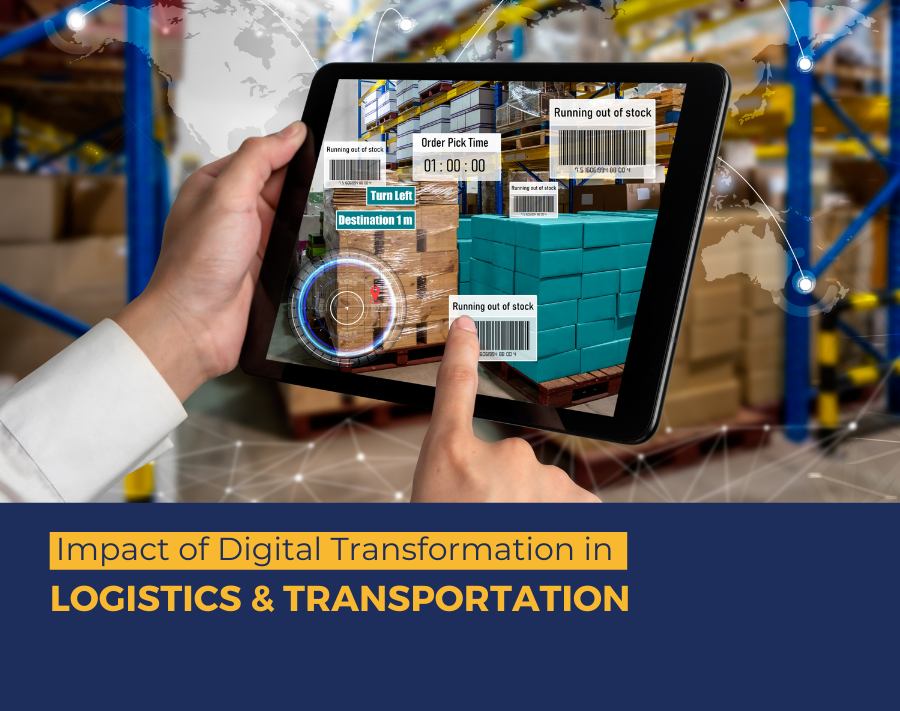
Impact of Digital Transformation in Logistics & Transportation
Stage Rejigdigital
Every industry wants to take support of digital transformation solutions to thrive. Be it manufacturing or automobile, chemical or healthcare, all the sectors are ready to jump on the digital transformation bandwagon. The digital transformation in logistics sector is also no exception! As companies in this sector are witnessing the brimming competition worldwide, their owners want to bring automation and accelerate evolution for grabbing opportunities.
A reputed digital transformation company can assist you to make a complete roadmap & considering three critical aspects- time, speed, efficiency. Thankfully, digital transformation in logistics and transportation can achieve all the objective with the help of real-time data and actionable insights along with automated processes.
Before discussing the benefits of digital transformation solutions, let’s understand the Logistics 4.0 concept in this blog.
Logistics 4.0- Eye on Future
With the objective of creating a transparent system, Logistics 4.0 combines people, machines, devices, and sensors. This combination is necessary to share the necessary data for efficient supply chain management. Logistics 4.0 offers higher visibility and control. It supports quick and real-time decisions based on actionable insights. Digital transformation in logistics assists the sector to leverage the benefits of Logistics 4.0.
As per the prediction of Adroit Market Research, digital transformation will touch $145.28 billion by 2025 in the transportation and logistics sector. Emerging digital technologies like IoT, AI, mobile apps, and RPA are ready to transform the way logistics companies operate worldwide. Let’s understand the roles of all these technologies in bringing revolutionary changes in the sector.
Role of IoT in Logistics and Transportation Industry
IoT provides actionable insights while contributing to remote asset monitoring solutions & maintenance. IoT can be integrated into the key points in the supply chain. It paves the way for an improved supply chain with end-to-end visibility. IoT ensures high accuracy and IoT-based logistics solutions can enable companies to monitor the location and speed of the fleet accurately. In a way, it enables logistics companies to manage the fleet seamlessly. IoT is also useful in equipment monitoring & management. By combining with predictive maintenance concept, the IoT technology can alert the engineers or technicians of potential breakdowns to avoid any big damage and machine downtime.
Role of AI in Logistics Sector
AI is transforming every sector as a vital component of digital transformation solutions. Talking about the logistics sector, the sales of AI-powered robots for warehousing and logistics will reach $22.4 billion by 2021 as per the survey. The AI technology can help the sector with demand forecasting, real-time decision making, contingency planning, and accurate processing of available information. AI can also support and strengthen the last-mile delivery concept.
AI has also a significant role to play in combination with big data analytics. It provides accurate actionable insights in the real-time.
Role of Mobile Applications in Logistics & Transportation Sector
A digital transformation company counts upon customized mobile apps for combining all the technologies. A feature-rich mobile app can bridge the gap between the advancements and the business systems. It is possible to improve services and enhance customer support for the logistics companies with the help of dedicated mobile apps. The logistics app can offer flexibility to optimize routes and schedules for delivery. With a location tracking feature, customers can know the real-time status of the parcel and get an ETA (Estimated Time of Arrival). A mobile app can also automate certain processes including booking and payment.
Also Read- Top Five Benefits of Digital Transformation Solutions for Manufacturing
A logistics app also improves the efficiency of drivers and increases accuracy to provide customers excellent experiences.
Role of RPA in Logistics Industry
Robotic Process Automation (RPA) increases overall productivity by handling mundane and repetitive activities efficiently. All data entry tasks can be handled by bots and employees can get more time to perform various critical tasks. RPA also plays a vital role in logistics management as a part of the digital transformation roadmap. Shipment scheduling and tracking becomes easy with RPA. As the name suggests, this technology brings automation in processes and eliminates human intervention.
RPA technology is also useful for increasing the speed of invoice. It is providing a seamless integration between various systems. This technology plays a crucial role in increasing customer responsiveness with automated order.
Concluding Lines
Digital transformation solutions can minimize the risks associated with human errors and bring more transparency in the logistics sector. With full control over inventory, asset, and fleet management, your logistics business can leverage the benefits of Logistics 4.0 and improve customer services.
Rejig Digital is a renowned company that makes a complete digital transformation roadmap for the logistics and IoT in transportation sector. Do you want to bring automation and optimize core processes using IoT-powered digital transformation solutions in logistics & transportation sector? Do you want to know more about our other advanced solutions? Just drop us a line at info@rejigdigital.com and we will gladly assist you for transforming your business processes.
